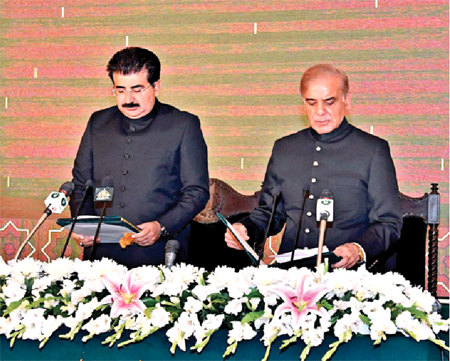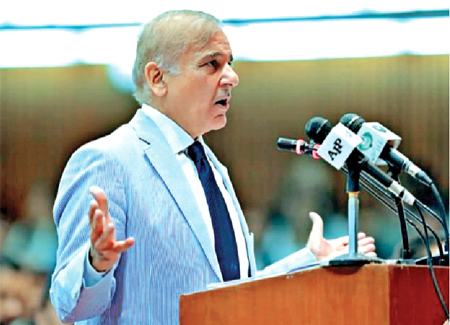After taking over the reins of Pakistan, Shehbaz Sharif’s rhetoric on Kashmir shows he, too, is using the same template used by his predecessors. It would be in the fitness of things if he focuses on domestic issues at this juncture when Pakistan itself is facing an existential crisis
The general refrain among a section of Pakistani politicians in particular and the public, in general, is that the US was responsible for the ouster of Imran Khan from power and handed over the reins of power to a ‘pliable and compromised’ politician to rule the country. To gain a ‘martyr’ status, Pakistani media, Imran Khan and his party leaders have been pushing this narrative. But Pakistani analysts vouch that there could be several reasons but the main reason is Imran Khan’s poor performance. “Now coming to the fall of the PTI, the reasons for it might seem complex but, in fact, they are as simple as those of its rise. One of them is the inability of Imran Khan to deliver on his promise of good governance, especially in Punjab. He was unable to truly win the support of the bureaucracy and to motivate the latter to go beyond the line of duty to sincerely work for the people,” states Pakistani civil servant Syed Saadat.
According to former Pakistani diplomat Touqir Hussain, the reality is that political dynamics in Pakistan have nearly always functioned fairly autonomously, and the primary, though not always the sole, “stimulus for the rise and fall of governments has been domestic, and not external”.
To buttress his argument, Hussain writes: “Zia-ul Haq’s regime was already there before the Afghan jihad and the revival of US-Pakistan relations; in fact, it had a pariah status because of the 1977 coup, the execution of an elected prime minister, and Pakistan’s pursuit of nuclear weapons. It was during Zia’s time that Pakistan was sanctioned in 1979. But with the Soviet invasion of Afghanistan, Zia became a celebrated leader in the West. Although Washington’s support for him had begun to waver before he died, his ‘regime’ lived on.”
Eminent journalist Najim Sethi, in an interview to an Indian channel, claimed that Imran lost power because of his failures. Talking to an Indian TV channel, the government fell because the military establishment which had foisted Imran dragged its feet. “The PTI was nurtured in the nursery of the Miltablishment like so many other parties. It was hoisted into office by the Miltablishment by herding “electables” into its lap, rigging the 2018 elections and inducing independents and smaller parties to join government. This obviously meant that the PTI’s organic and ideological roots were weak. It couldn’t take the pressure to stand up and be counted when the chips were down, especially when the Miltablishment parted ways with Imran Khan after two frustrating years trying to teach him on how to run a good ship and make their hybrid experiment successful,” Sethi writes.
What served as the proverbial last nail in the PTI government’s coffin was his meddling in the internal affairs of the army. He sought to extend the term of Lt Gen Faiz Hameed as DG ISI with a view to using his secret services to consolidate power in exchange for promising to make him army chief way out of turn. “This alienated him from a clutch of senior generals, each of whom had a legitimate expectation of succeeding to the most powerful office in the country. Indeed, this group led by the army chief, General Qamar Javed Bajwa, reacted angrily when he refused to surrender General Faiz’s services to them. In the end, the generals had their way, but by then their relationship was on a downward slide, with both sides bristling with indignation.”
It is often said that the three pillars of Pakistan’s existence are – Allah, Army and America. Pakistani analysis argue that though US still tries to gain and maintain influence in Pakistan, it won’t engineer coups to have its way, as Imran wants the world to believe. It has other powerful tools such as funds, sanctions and military hardware to bring Pakistan around. Echoing the argument, a senior associate at the Center for Strategic and International Studies and a former assistant secretary of state for South Asia Robin Raphel said, “We have so many other fish to fry.” For years, the US used to get its things done through the army and it doesn’t give much weight to the political establishment.

From the Bharatiya perspective, Sharif’s rhetoric on Kashmir has not gone down well though New Delhi has not responded in equal measure. But it would be in the interests of Pakistan to make a departure from its Kashmir stance and focus on its domestic issues
Imran having burned the bridges with the Generals, Shehbaz Sharif fits the bill for the army. For China, too, which is also a major benefactor of Pakistan, Shehbaz works well, according to analysts. China, according to them, is upset with Imran as he has failed to deliver on the CPEC project. On the other hand, Shehbaz equation with the Chinese is said to be in good stead, given his business interests.
From the Bharatiya perspective, Sharif’s rhetoric on Kashmir has not gone down well though New Delhi has not responded in equal measure. But it would be in the interests of Pakistan to make a departure from its Kashmir stance and focus on its domestic issues. That would serve Sharif and his country better.
However, one cannot be overly optimistic about the future of Pakistani democracy. It has more to do with the ideology that drives that country. Once, commenting on democracy in the subcontinent (Bharat, Pakistan and Bangladesh), former Sarsanghchalak Rajendra Singh said, “If the British were responsible for democracy in this part of the country, why it is not working well in the other two countries?”














Comments